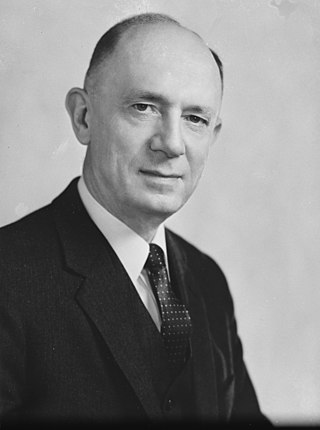
The solicitor general of the United States, the third-highest ranking official within the United States Department of Justice, represents the federal government in cases before the U.S. Supreme Court. Elizabeth Prelogar has served in the role since October 28, 2021.
Regents of the University of California v. Bakke, 438 U.S. 265 (1978) was a landmark decision by the Supreme Court of the United States which involved a dispute of whether preferential treatment for minorities can reduce educational opportunities for whites without violating the Constitution. It upheld affirmative action, allowing race to be one of several factors in college admission policy. However, the court ruled that specific racial quotas, such as the 16 out of 100 seats set aside for minority students by the University of California, Davis, School of Medicine were impermissible.

Yaser Esam Hamdi is a former American citizen who was captured in Afghanistan in 2001. The United States government claims that he was fighting with the Taliban against U.S. and Afghan Northern Alliance forces. He was declared an "illegal enemy combatant" by the Bush administration and detained for almost three years without charge. On October 9, 2004, on the condition that he renounce his U.S. citizenship and commit to travel prohibitions and other conditions, the government released him and deported him to Saudi Arabia, where he had been raised.
Trop v. Dulles, 356 U.S. 86 (1958), was a United States Supreme Court case in which the Court ruled that it was unconstitutional to revoke citizenship as a punishment for a crime. The ruling's reference to "evolving standards of decency" is frequently cited in Eighth Amendment jurisprudence.

Isaac Beverly Lake Sr. (1906–1996), was an American jurist, law professor at Wake Forest University and Campbell University, and politician. He was born in Wake Forest, North Carolina.
Hill v. McDonough, 547 U.S. 573 (2006), was a United States Supreme Court case challenging the use of lethal injection as a form of execution in the state of Florida. The Court ruled unanimously that a challenge to the method of execution as violating the Eighth Amendment to the United States Constitution properly raised a claim under 42 U.S.C. § 1983, which provides a cause of action for civil rights violations, rather than under the habeas corpus provisions. Accordingly, that the prisoner had previously sought habeas relief could not bar the present challenge.
The American Council on Education (ACE) is a nonprofit 501(c)(3) U.S. higher education association established in 1918. ACE's members are the leaders of approximately 1,700 accredited, degree-granting colleges and universities and higher education-related associations, organizations, and corporations. The organization, located in Washington, D.C., conducts public policy advocacy, research, and other initiatives related to key higher education issues and offers leadership development programs to its members and others in the higher education community.

Sholom Mordechai Rubashkin was a convicted felon and the former CEO of Agriprocessors, a now-bankrupt kosher slaughterhouse and meat packing plant in Postville, Iowa, formerly owned by his father, Aaron Rubashkin. During his time as CEO of the plant, Agriprocessors grew into one of the nation's largest kosher meat producers, but was also cited for issues involving animal cruelty, food safety, environmental safety, child labor, and hiring undocumented immigrants.
The American Civil Rights Union (ACRU) is an American legal organization founded by former Reagan Administration official Robert B. Carleson in 1998 as a conservative counter to the American Civil Liberties Union.
Stinson v. United States, 508 U.S. 36 (1993), is a decision of the United States Supreme Court that held Sentencing Commission guidelines may be cited as binding authority when courts issue sentences for criminal defendants.
Davis v. Bandemer, 478 U.S. 109 (1986), is a case in which the United States Supreme Court held that claims of partisan gerrymandering were justiciable, but failed to agree on a clear standard for the judicial review of the class of claims of a political nature to which such cases belong. The decision was later limited with respect to many of the elements directly involving issues of redistricting and political gerrymandering, but was somewhat broadened with respect to less significant ancillary procedural issues. Democrats had won 51.9% of the votes, but only 43/100 seats. Democrats sued on basis of one man, one vote, however, California Democrats supported the Indiana GOP's plan.
Established in 1977, Atlantic Legal Foundation is a nonprofit, nonpartisan public interest law firm with a history of advocating for individual liberty, free enterprise, property rights, limited and efficient government, sound science in the courtroom, and school choice. Atlantic Legal provides legal representation, without fee, to individuals, corporations, trade associations, parents, scientists and educators. The Foundation frequently files amicus curiae briefs in high-profile court cases before state supreme courts, federal circuit courts, and the United States Supreme Court.
Philip Elman was an American lawyer at the United States Department of Justice and former member of the Federal Trade Commission (FTC). Elman is best known for writing the government's brief in Brown v. Board of Education. Elman is also notable for being one of just three political independents to have ever served on the FTC.

Cardona v. Shinseki was an appeal brought in the United States Court of Appeals for Veterans Claims (CAVC) of a decision by the Board of Veterans' Appeals upholding the denial of service-connected disability benefits for the dependent wife of a female veteran. The United States Department of Veterans Affairs denied the disability benefits based on the definition of "spouse" as "a person of the opposite sex" under federal statute. On March 11, 2014, the CAVC dismissed the case as moot after the Secretary of Veterans Affairs advised the Court that he would neither defend nor enforce the federal statute. Cardona subsequently received full payment of her spousal benefits, retroactive to her date of application.

Capitol Records, LLC v. ReDigi Inc., 934 F. Supp. 2d 640 , is a case from the United States District Court for the Southern District of New York concerning copyright infringement of digital music. In ReDigi, record label Capitol Records claimed copyright infringement against ReDigi, a service that allows resale of digital music tracks originally purchased from the iTunes Store. Capitol Records' motion for a preliminary injunction against ReDigi was denied, and oral arguments were given on October 5, 2012.

Florida v. Harris, 568 U.S. 237 (2013), was a case in which the United States Supreme Court addressed the reliability of a dog sniff by a detection dog trained to identify narcotics, under the specific context of whether law enforcement's assertions that the dog is trained or certified is sufficient to establish probable cause for a search of a vehicle under the Fourth Amendment to the United States Constitution. Harris was the first Supreme Court case to challenge the dog's reliability, backed by data that asserts that on average, up to 80% of a dog's alerts are wrong. Twenty-four U.S. States, the federal government, and two U.S. territories filed briefs in support of Florida as amici curiae.
Susan B. Anthony List v. Driehaus, 573 U.S. 149 (2014), is a United States Supreme Court case.
Students for Fair Admissions, Inc. v. President and Fellows of Harvard College and Students for Fair Admissions, Inc. v. University of North Carolina are a pair of lawsuits concerning racial discrimination in affirmative action programs in college admissions processes. The first case involves Harvard University's undergraduate admissions process which is claimed to discriminate against Asian American applicants, while the second centers on the University of North Carolina's use of socioeconomic factors in administration, which is claimed to incorporate race and violate Title VI of the Civil Rights Act of 1964. Both cases seek review of the Supreme Court decision Grutter v. Bollinger (2003) which validated the use of affirmative action programs in college admissions as long as race is not used as the sole deciding factor.
Heffernan v. City of Paterson, 578 U.S. ___ (2016), was a United States Supreme Court case in 2016 concerning the First Amendment rights of public employees. By a 6–2 margin, the Court held that a public employee's constitutional rights might be violated when an employer, believing that the employee was engaging in what would be protected speech, disciplines them because of that belief, even if the employee did not exercise such a constitutional right.
Frank v. Gaos, 586 U.S. ___ (2019), was a per curiam decision by the Supreme Court of the United States in a case concerning the practice of cy pres settlements in class action lawsuits. Following oral argument, the court asked the parties to submit supplemental briefs addressing whether the parties had Article III standing to pursue the case in federal courts. Supplemental briefing was completed on December 21, 2018. On March 20, 2019, the court remanded the case to the Ninth Circuit to address the plaintiffs’ standing in light of Spokeo, Inc. v. Robins.







